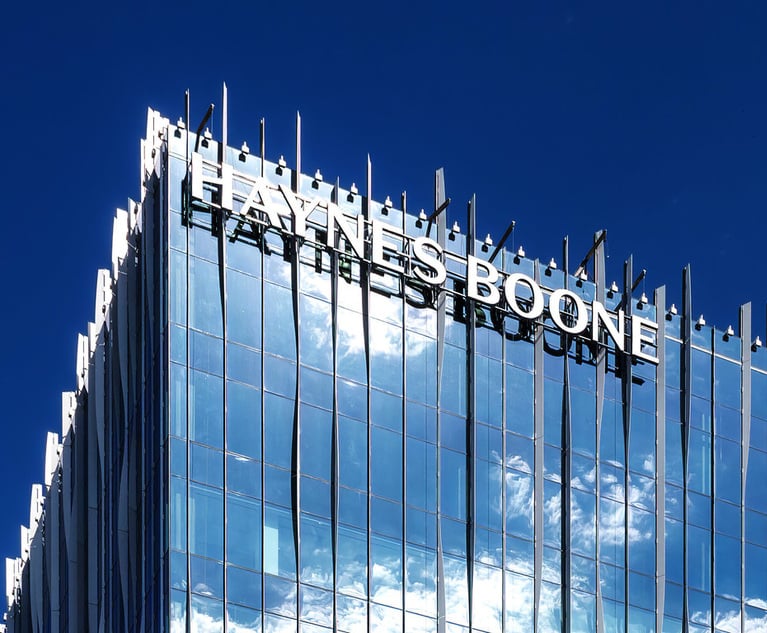 Photo: ambrozinio/Shutterstock.com
Photo: ambrozinio/Shutterstock.comCan 91a Dismissal Motions Use Affirmative Defenses? This High Court Case Will Decide
When considering Rule 91a motions to dismiss, which dismiss claims with no basis in law or fact, some intermediate appellate courts have ruled that they are allowed to consider affirmative defenses. Other courts have ruled the opposite. The Texas Supreme Court will decide the split in this case.
November 04, 2019 at 03:00 PM
4 minute read
It's an issue that's split appellate courts.
When defendants in Texas courts move to dismiss a lawsuit, claiming it has no basis in law or fact, are they allowed to raise affirmative defenses such as the statute of limitations or attorney immunity?
Two Dallas attorneys will face off Thursday in arguments before the Texas Supreme Court, which will decide how trial courts should handle affirmative defenses raised in motions to dismiss under Texas Rule of Civil Procedure 91a. The petitioner in the case argues the motion-to-dismiss stage is too early to consider affirmative defenses, because that requires considering facts outside of the petition itself. The respondent, meanwhile, argues it's proper for a court to determine if a petition establishes a legal bar—such as an affirmative defense—to the plaintiff's claim.
Rule 91a was colloquially called "loser pays" when it passed the Texas Legislature in 2011, because if a case gets dismissed the movant wins attorney fees. Similar to the Federal Rule of Civil Procedure 12(b)(6), Texas' Rule 91a allows for the early dismissal of a claim with no basis in law or fact. But the federal and state versions have important differences.
In Bethel v. Quilling, Selander, Lownds, Winslett & Moser, Cheryln Bethel's husband died in an accident caused by defective trailer brakes and she sued the brakes manufacturer. James Moody and Quilling, Selander, Lownds, Winslett & Moser were opposing counsel who represented the brakes manufacturer.
Later, Bethel sued Moody and Quilling Selander as well. She alleged that either they or their experts took the brakes apart and destroyed their condition, impairing their use as evidence in her underlying wrongful death case.
The lawyer and firm filed a 91a motion to dismiss that argued Bethel's claims were barred by the attorney immunity doctrine, which shields Texas attorneys from liability to a third party for conduct they undertook in representation of a client. The trial court granted dismissal and awarded Moody and Quilling Selander $7,480 in attorney fees. The Fifth Court upheld the ruling.
|Appellate Arguments
Bethel argues in her appeal that attorney immunity didn't apply to the type of lawyer conduct she alleged in her lawsuit. The law firm should have pleaded and proved its affirmative defense in its own pleadings, she claimed. She also argued that the Fifth Court inferred facts in her own pleadings to support the law firm's attorney immunity argument.
"Affirmative defenses cannot bar a plaintiff's claim at the early-dismissal stage," said Bethel's brief on the merits. "The plain language of Rule 91a prohibits looking outside the plaintiff's pleading when evaluating a claim's basis in law."
Bethel's attorney, Jessica Foster, an associate with Durham, Pittard & Spalding in Dallas, didn't immediately return a call seeking comment.
But Quilling Selander noted in its brief on the merits that Bethel raised an argument in her own pleading that attorney immunity did not bar her claims. That's why it was appropriate for the court to consider that affirmative defense in the case. The firm claimed that even if she didn't raise attorney immunity in her pleading, it still would have been proper for a court to consider it under a Rule 91a motion.
"A court is permitted to consider whether the facts as alleged by the plaintiff establish a legal bar to recovery, such as the application of an affirmative defense," the firm's brief said. "There is no basis in law for the claims asserted by Bethel because they are barred by the attorney immunity doctrine."
Quilling Selander shareholder Marcie Schout of Dallas, who's arguing for her firm, didn't immediately return an email seeking comment.
Quilling Selander has agreed to give five minutes of its time in oral argument Thursday to the state of Texas, which filed an amicus brief in the case that argues it's proper to consider affirmative defenses with Rule 91a motions.
This content has been archived. It is available through our partners, LexisNexis® and Bloomberg Law.
To view this content, please continue to their sites.
Not a Lexis Subscriber?
Subscribe Now
Not a Bloomberg Law Subscriber?
Subscribe Now
NOT FOR REPRINT
© 2024 ALM Global, LLC, All Rights Reserved. Request academic re-use from www.copyright.com. All other uses, submit a request to [email protected]. For more information visit Asset & Logo Licensing.
You Might Like
View All

Advising 'Capital-Intensive Spaces' Fuels Corporate Practice Growth For Haynes and Boone
4 minute read
Homegrown Texas Law Firms Expanded Outside the Lone Star State in 2024 As Out-of-State Firms Moved In
5 minute read
Energy Lawyers Working in Texas Expect Strong Demand to Continue in 2025 Across Energy Sector
6 minute readTrending Stories
- 1The Key Moves in the Reshuffling German Legal Market as 2025 Dawns
- 2Social Media Celebrities Clash in $100M Lawsuit
- 3Federal Judge Sets 2026 Admiralty Bench Trial in Baltimore Bridge Collapse Litigation
- 4Trump Media Accuses Purchaser Rep of Extortion, Harassment After Merger
- 5Judge Slashes $2M in Punitive Damages in Sober-Living Harassment Case
Who Got The Work
Michael G. Bongiorno, Andrew Scott Dulberg and Elizabeth E. Driscoll from Wilmer Cutler Pickering Hale and Dorr have stepped in to represent Symbotic Inc., an A.I.-enabled technology platform that focuses on increasing supply chain efficiency, and other defendants in a pending shareholder derivative lawsuit. The case, filed Oct. 2 in Massachusetts District Court by the Brown Law Firm on behalf of Stephen Austen, accuses certain officers and directors of misleading investors in regard to Symbotic's potential for margin growth by failing to disclose that the company was not equipped to timely deploy its systems or manage expenses through project delays. The case, assigned to U.S. District Judge Nathaniel M. Gorton, is 1:24-cv-12522, Austen v. Cohen et al.
Who Got The Work
Edmund Polubinski and Marie Killmond of Davis Polk & Wardwell have entered appearances for data platform software development company MongoDB and other defendants in a pending shareholder derivative lawsuit. The action, filed Oct. 7 in New York Southern District Court by the Brown Law Firm, accuses the company's directors and/or officers of falsely expressing confidence in the company’s restructuring of its sales incentive plan and downplaying the severity of decreases in its upfront commitments. The case is 1:24-cv-07594, Roy v. Ittycheria et al.
Who Got The Work
Amy O. Bruchs and Kurt F. Ellison of Michael Best & Friedrich have entered appearances for Epic Systems Corp. in a pending employment discrimination lawsuit. The suit was filed Sept. 7 in Wisconsin Western District Court by Levine Eisberner LLC and Siri & Glimstad on behalf of a project manager who claims that he was wrongfully terminated after applying for a religious exemption to the defendant's COVID-19 vaccine mandate. The case, assigned to U.S. Magistrate Judge Anita Marie Boor, is 3:24-cv-00630, Secker, Nathan v. Epic Systems Corporation.
Who Got The Work
David X. Sullivan, Thomas J. Finn and Gregory A. Hall from McCarter & English have entered appearances for Sunrun Installation Services in a pending civil rights lawsuit. The complaint was filed Sept. 4 in Connecticut District Court by attorney Robert M. Berke on behalf of former employee George Edward Steins, who was arrested and charged with employing an unregistered home improvement salesperson. The complaint alleges that had Sunrun informed the Connecticut Department of Consumer Protection that the plaintiff's employment had ended in 2017 and that he no longer held Sunrun's home improvement contractor license, he would not have been hit with charges, which were dismissed in May 2024. The case, assigned to U.S. District Judge Jeffrey A. Meyer, is 3:24-cv-01423, Steins v. Sunrun, Inc. et al.
Who Got The Work
Greenberg Traurig shareholder Joshua L. Raskin has entered an appearance for boohoo.com UK Ltd. in a pending patent infringement lawsuit. The suit, filed Sept. 3 in Texas Eastern District Court by Rozier Hardt McDonough on behalf of Alto Dynamics, asserts five patents related to an online shopping platform. The case, assigned to U.S. District Judge Rodney Gilstrap, is 2:24-cv-00719, Alto Dynamics, LLC v. boohoo.com UK Limited.
Featured Firms
Law Offices of Gary Martin Hays & Associates, P.C.
(470) 294-1674
Law Offices of Mark E. Salomone
(857) 444-6468
Smith & Hassler
(713) 739-1250






